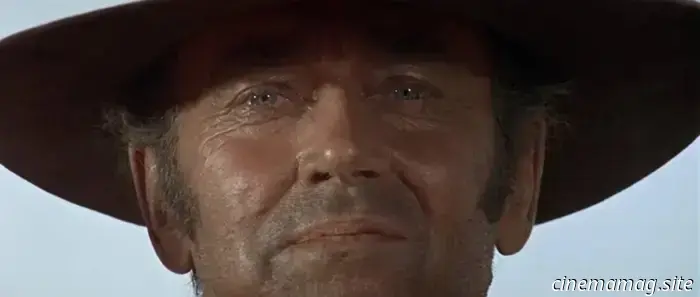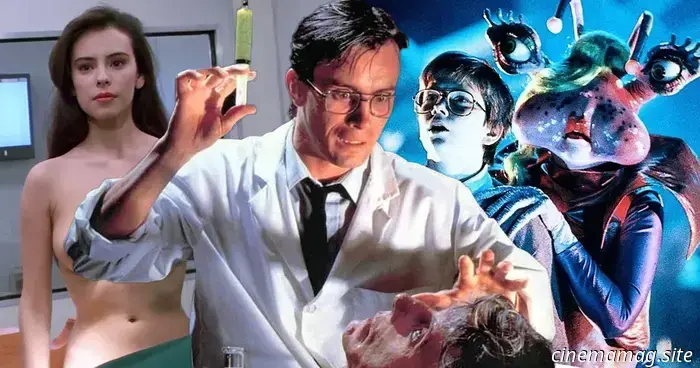
Review of Henry Fonda for President: The Fading Vision of an Improved America
The Academy Awards may not hold significant importance in the overall narrative of film history, but the fact that the iconic actor Henry Fonda secured his first competitive Oscar just five months before his passing invites contemplation on a larger scale. The film "Henry Fonda for President," released during a time when America appears to be visibly collapsing, likely encourages such reflections. It's difficult not to feel some emotional resonance with this film, despite its eventual implication of a harsh reality.
Director and film historian Alexander Horwath presents a three-hour video essay that covers a wide array of concepts over its possibly excessive duration. The essay starts with Horwath recalling a pivotal moment in his cinephilia: a family trip to Paris in the summer of 1980, where as a teenager, he watched several Henry Fonda films at the Cinémathèque alongside his parents. This occurred simultaneously as Fonda was making his final film, "On Golden Pond," while Ronald Reagan was securing the Republican presidential nomination, marking a step in history that seemed to lead towards a bleaker future. The film often contrasts Fonda, a distinguished actor with progressive beliefs, against Reagan, a subpar performer with even more troubling views. History has revealed the outcome of this rivalry. In an era where people’s parasocial relationships with celebrities often lead to unsettling consequences on social media, Horwath’s film offers a thesis closely related to our inclination towards projection. Part of me wonders: why does the Austrian still care so deeply about America?
The film's title is inspired by an episode of the often-overlooked Norman Lear sitcom "Maude," where the openly liberal protagonist places her hopes for the 1976 presidential election on the esteemed actor. Representing New Deal ideals through films like "The Grapes of Wrath" and embodying ‘50s liberal humanism in "12 Angry Men," Fonda resonated with fundamentally good Americans alienated by reactionary figures like Eisenhower and Nixon. Off screen, Fonda frequently embodied the morals of the honorable characters he portrayed, acting as a Tom Joad-like voice of reason.
Horwath organizes the film not solely through clips and interviews from Fonda’s filmography but also through his own journey across America, exploring how locations from Fonda’s films and his life remain nearly 80 to 90 years later. It’s hard to overlook the awkward connection between Fonda's theatrical days and footage from an outdoor performance of "Hamilton," especially when it shifts to a performer wearing a Trump mask in Times Square, which only serves to underscore a potential desire to forget the past decade of culture.
There are elements of Horwath’s project that remind me of Wim Wenders’ road movies: a classical, Hollywood-admiring European idealizing America while traversing it. Wenders’ earnest sentimentality might be hard to emulate today and tends to frustrate many contemporary cinephiles. Delve deeper, and it becomes clear that Fonda is more of an exception than the norm—a nuance the film somewhat acknowledges.
The film’s sincerity is endearing, yet it can also become challenging to engage with over time. While it indicates from the outset the inevitable decline of Fonda’s legacy amid the Reagan revolution that irrevocably transformed America, it's difficult not to feel a sense of regret over paths not taken.
"Henry Fonda for President" premieres at Anthology Film Archives on Thursday, April 3, with plans for expansion.
Other articles
 Dexter: Original Sin has been renewed for a second season.
Viewers can expect to see more of a young Dexter Morgan as Paramount and Showtime have confirmed a second season of the prequel, Dexter: Original Sin. Set in 1991, Dexter: Original Sin explores the journey of a recently graduated Dexter as he evolves from a student into a serial killer. As an intern at Miami Metro, Dexter teamed up with his father Harry and […]
Dexter: Original Sin has been renewed for a second season.
Viewers can expect to see more of a young Dexter Morgan as Paramount and Showtime have confirmed a second season of the prequel, Dexter: Original Sin. Set in 1991, Dexter: Original Sin explores the journey of a recently graduated Dexter as he evolves from a student into a serial killer. As an intern at Miami Metro, Dexter teamed up with his father Harry and […]
 Sydney Sweeney is in discussions for a live-action Gundam film.
Deadline has reported that Sydney Sweeney, known for her roles in Euphoria and Anyone But You, is in the final stages of negotiations with Legendary Entertainment to join the cast of their live-action mecha film Gundam. The Gundam movie has been in the works at Legendary for several years, in collaboration with Bandai Namco Filmworks, the owner of the Japanese franchise.
Sydney Sweeney is in discussions for a live-action Gundam film.
Deadline has reported that Sydney Sweeney, known for her roles in Euphoria and Anyone But You, is in the final stages of negotiations with Legendary Entertainment to join the cast of their live-action mecha film Gundam. The Gundam movie has been in the works at Legendary for several years, in collaboration with Bandai Namco Filmworks, the owner of the Japanese franchise.
-Movie-Review.jpg) The Luckiest Man in America (2025) - Film Review
The Luckiest Man in America, 2025. Directed by Samir Oliveros. Featuring Paul Walter Hauser, Walton Goggins, Shamier Anderson, David Strathairn, Maisie Williams, Patti Harrison, Brian Geraghty, Haley Bennett, Johnny Knoxville, David Rysdahl, Shaunette Renée Wilson, Ricky Russert, Lilli Kay, and James Wolk. SYNOPSIS: Set in May 1984, the story follows an out-of-work ice cream truck driver who enters the game […]
The Luckiest Man in America (2025) - Film Review
The Luckiest Man in America, 2025. Directed by Samir Oliveros. Featuring Paul Walter Hauser, Walton Goggins, Shamier Anderson, David Strathairn, Maisie Williams, Patti Harrison, Brian Geraghty, Haley Bennett, Johnny Knoxville, David Rysdahl, Shaunette Renée Wilson, Ricky Russert, Lilli Kay, and James Wolk. SYNOPSIS: Set in May 1984, the story follows an out-of-work ice cream truck driver who enters the game […]
 Tower of God: New World hints at an upcoming collaboration with hololive through a new trailer.
Netmarble has unveiled a new teaser trailer (view it below) for their collectible RPG, Tower of God: New World, which hints at an upcoming collaboration event with Japan’s well-known VTuber group ‘hololive’. The immense popularity of this all-female VTuber group has led to its expansion beyond virtual streaming into game streaming, music production, and live performances. [...]
Tower of God: New World hints at an upcoming collaboration with hololive through a new trailer.
Netmarble has unveiled a new teaser trailer (view it below) for their collectible RPG, Tower of God: New World, which hints at an upcoming collaboration event with Japan’s well-known VTuber group ‘hololive’. The immense popularity of this all-female VTuber group has led to its expansion beyond virtual streaming into game streaming, music production, and live performances. [...]
 Now You See Me 3 has been given a title as Now You See Me 4 is revealed.
The Now You See Me franchise had a surprise in store at today’s Lionsgate CinemaCon panel, unveiling that the next sequel will be titled Now You See Me: Now You Don’t, and further exciting fans by announcing that Now You See Me 4 is also in development. Lionsgate showcased […]
Now You See Me 3 has been given a title as Now You See Me 4 is revealed.
The Now You See Me franchise had a surprise in store at today’s Lionsgate CinemaCon panel, unveiling that the next sequel will be titled Now You See Me: Now You Don’t, and further exciting fans by announcing that Now You See Me 4 is also in development. Lionsgate showcased […]
 8 Fantastic Cult Sci-Fi Films from 1985
Casey Chong examines eight outstanding cult sci-fi films from 1985. That year was significant for the sci-fi classic Back to the Future, which grossed more than $210 million in the U.S. alone. Robert Zemeckis’ groundbreaking time-travel film still stands as a cinematic landmark today. Nonetheless, the year also featured several other […]
8 Fantastic Cult Sci-Fi Films from 1985
Casey Chong examines eight outstanding cult sci-fi films from 1985. That year was significant for the sci-fi classic Back to the Future, which grossed more than $210 million in the U.S. alone. Robert Zemeckis’ groundbreaking time-travel film still stands as a cinematic landmark today. Nonetheless, the year also featured several other […]
Review of Henry Fonda for President: The Fading Vision of an Improved America
The Academy Awards may not hold significant importance in the broader context of film history, but the fact that the iconic actor Henry Fonda won his first competitive Oscar just five months before his death is certainly a thought-provoking occurrence on a cosmic level. Henry Fonda for President arrives at a time when it appears that
